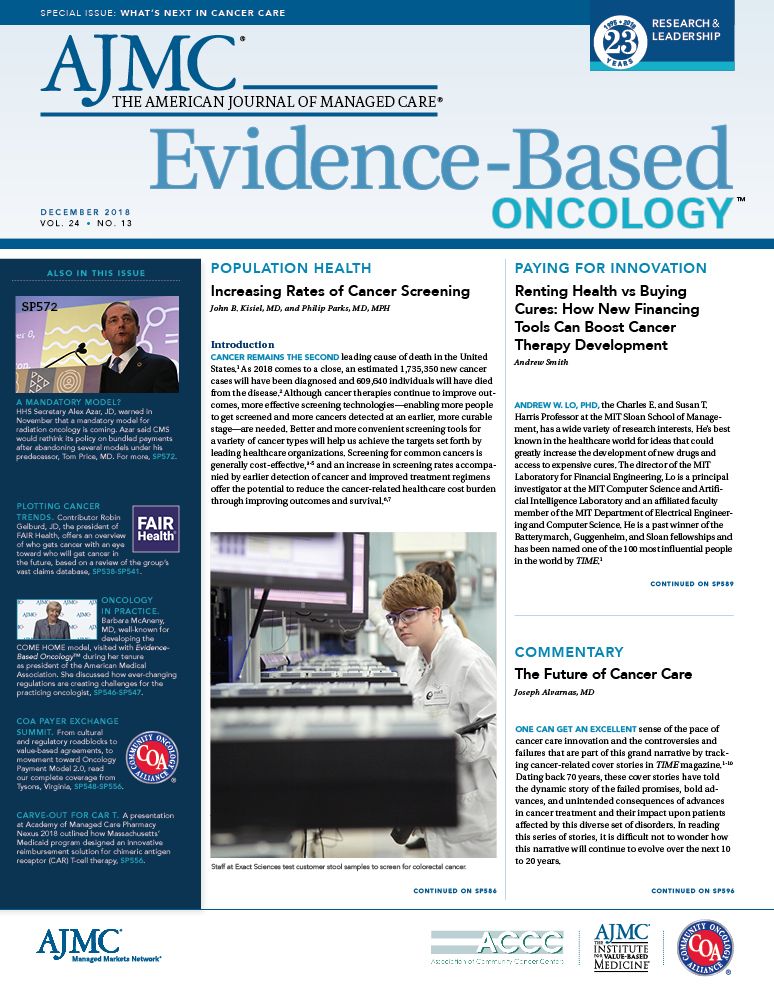- Center on Health Equity & Access
- Clinical
- Health Care Cost
- Health Care Delivery
- Insurance
- Policy
- Technology
- Value-Based Care
From the Editor-in-Chief: Why the Future Never Arrives
For a recent article in Wired, “25 Years of WIRED Predictions: Why the Future Never Arrives,” David Karpf reviewed every issue in chronological order to get a sense of how accurately the magazine had predicted the future.1 He found experts and sages to have a relatively poor track record for predicting what will happen. “The mistake that seems most glaring is the magazine’s confidence that technology and the economics of abundance would erase social and economic inequality,” he wrote.
Karpf’s key finding is worth remembering as we consider the future of cancer care. In a time of unprecedented innovation in oncology therapeutics and genomic diagnostics, it is easy for our excitement at these technologies to obscure our view of the gaps in patient access to equitable cancer care, the challenges of paying for ever more expensive treatments, and
the lack of transparency around care outcomes. As advances in diagnostic and therapeutic cancer care technologies offer promise to patients in need, without an effective system that can deliver them to patients in a sustainable way, there will be no way to ensure that the promise of these advances translates into realty for patients who need them most.
As Karpf realized, technology alone will not save us. The future of cancer care requires a delivery system that fosters greater patient engagement, including more effective cancer screening; more creative and sustainable ways of funding continued advances; sustainable reimbursement models for innovative therapeutics; and the creation of a more patient-centered ecosystem for care delivery that more effectively meets patients’ needs and overcomes barriers to care delivery, including those related to social determinants of health.
In this issue of Evidence Based OncologyTM, we take the opportunity to both look at the impact of these advances in cancer care and at how our systems of care will need to evolve. Robin Gelburd, JD, president of FAIR Health, reviews claims data to better understand who gets cancer and who is likely to get cancer in the future. In a complementary article, we get a perspective from authors at Mayo Clinic and Exact Sciences on the future of cancer screening. In Andrew Smith’s interview with Professor Andrew Lo, of the MIT Sloan School of Management, we learn of some new models for funding drug innovation that may point to a future in which greater patient needs, particularly among patients with rare tumors, may be addressed through a model that differs from that of traditional pharmaceutical research and development. We also have 2 articles that speak toward how we might meet some of the challenges of the high cost of anticancer drugs. Finally, we get both the perspective of the Community Oncology Alliance and Barbara McAneny, MD, a medical oncologist and the current president of the American Medical Association, on their work to foster more effective ecosystems for delivering cancer care.
At the recent Patient Centered Oncology Care® meeting, several expert participants voiced a common sentiment: As oncologists, we are inherently optimistic about the future. The possibilities for patients with cancer have never been brighter. Innovations and diagnosis and cancer therapeutics have changed the prognosis for many patients with advanced cancers and point toward a future with an even more dynamic pace of innovation. As we work together to navigate the challenges of care cost and create more patient-centric systems for care delivery, I am deeply optimistic that patients and their families will benefit tremendously from these advances. A key part of the mission of Evidence-Based OncologyTM is to foster discussions among the many cancer care stakeholders whose coordinated efforts are required to achieve this vision of the future. Throughout the next year, we look forward to bringing more of these conversations to you.
REFERENCE:
1. Karpf D. 25 years of WIRED predictions: why the future never arrives. Wired. September 18, 2018. wired.com/story/wired25-david-karpf-issues-tech-pre- dictions/. Accessed November 28, 2018.

Specialty and Operator Status Influence Electronic Health Record Use Variation
January 22nd 2026Operators demonstrated specialty-specific differences in electronic health record efficiency, timeliness, and after-hours use, highlighting how workflow and training shape documentation behaviors across medical disciplines.
Read More
Exploring Racial, Ethnic Disparities in Cancer Care Prior Authorization Decisions
October 24th 2024On this episode of Managed Care Cast, we're talking with the author of a study published in the October 2024 issue of The American Journal of Managed Care® that explored prior authorization decisions in cancer care by race and ethnicity for commercially insured patients.
Listen

